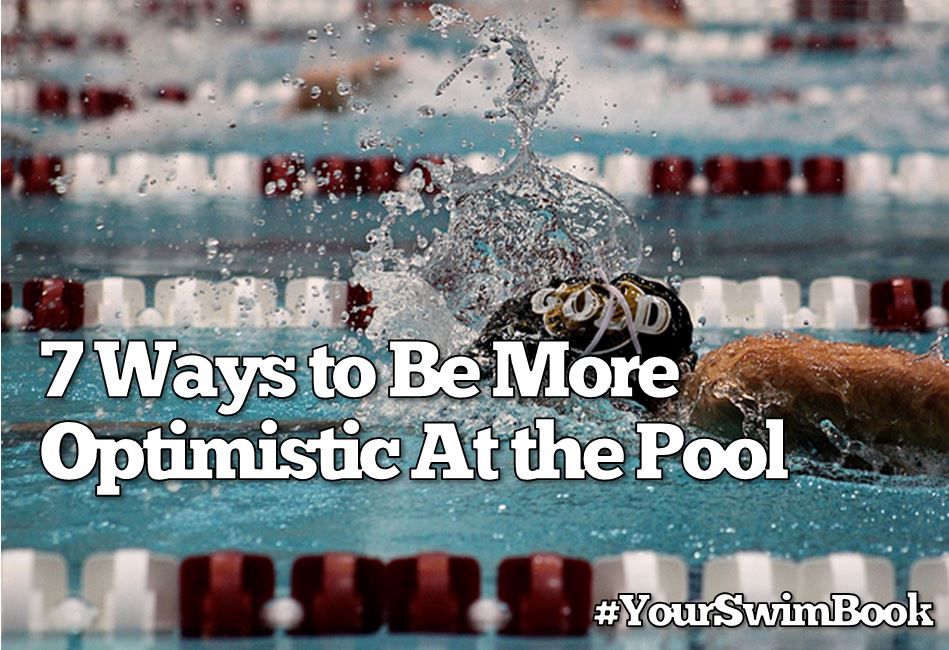
Pump Up Songs for Swimmers: How Tunes Can Help You Swim Faster
Here is the science behind how pump songs can help swimmers perform faster in the water.


The only thing more annoying then a swimmer who complains mercilessly about homework, hard sets and reality television is the unfettered optimist.
You know this person.
They bounce around, fake smile plastered across their face, smiling away in denial of the realities of the world. Everything is “sooo.”
“That is soooo the best. This set is soooo awesome guys, let’s go! We gonna swim soooo fast this weekend! Thank you sooo much.”
Ugh.
This forced, bubblegum cheeriness, while at its foundation comes from a good place, tends to elicit the opposite from its intended reaction. Instead of provoking happiness or optimism from others, it evokes a measured rage.
What I want to talk about is not an emotion. It’s not about being “happy” which in itself is a very subjective thing. What we are going to talk about is optimism. While there may be some overlapping areas between happiness and optimism, there is a distinct difference between the two.
Having optimism means that you view your life as full of possibility and opportunity. It’s something we can help dictate. Happiness is an emotion, a feeling, something that kind of comes and goes, and that is also a by-product of being optimistic.
Here are 7 ways to be more optimistic with your swimming–
It’s fairly easy to fall into the trap of comparing yourself to other swimmers. This is a competitive sport, after all, where your results are measured and dictated by the performance of others. Using the competition as a barometer for how you feel about yourself means that you lose the initiative, giving up control over how you feel. If you are going to start comparing, do so against earlier versions of yourself instead. Strive to improve on what you can control, instead of judging yourself based on the performance of others.
We all have these people in our lives. They complain, nag, whine. Nothing is good enough when things are going well, and it’s a zombie apocalypse when things go awry. It can be particularly difficult to avoid the doom-and-gloom types when they are in your lane every day, or in your circle of friends, or in your home. The affiliations and relationships you have should build and nurture your development, not impair it with excessive negativity. Your swimming – and let’s face it, life as well – is exceedingly too short to spend with negative people.
The allure of the big, awesome goal at the end of the tunnel is hard to resist. But with great distance comes great anxiety as well, as the realization of how much work remains to get there can become overwhelming. Combat this by achieving a sequence of small goals. Get into the habit of setting one goal per workout. Pick one thing to excessively focus on. Doing this will develop your goal setting muscles to the point that when you decide on a goal, the execution of it will be habit. And not only that, but the string of small, tiny successes will help you fuel your confidence and motivation for the bigger journey.
I swam with a kid who really didn’t seem to enjoy the sport. This was particularly evident in the harder sets of the session, where between repeats he would grumble and curse under his breath about the set, about coach, about the lifeguard, the pool temperature… and so on. When he got particularly sour, I would distract him by telling him a funny story, make fart noises to interrupt his complaining, or I would engage him in a trade of movie quotes. After each repeat, we would have to each think of a movie quote, and the other would have to name the movie. What I didn’t know I was doing at the time was deflecting his grumpiness, and helping to create a more positive environment for myself, for Mr. Negato, and the other swimmers in our lane. Helping to create a positive environment doesn’t mean you have to overly peppy, or excessively “Rah rah, let’s go guys, this one’s for the Gipper!” Something as simple as a well timed joke, or the movie quote game, can help create a more pleasant environment.
No matter how much positivity we force upon ourselves, things will still fall apart on occasion. Whether its getting DQ’d at a big meet, an awful swim, or an injury, life has an uncanny ability to whip a curveball at us just when we think we have things figured out. In the aftermath of these setbacks, avoid the finger-pointing, the self-blame, and latching on to the worst aspects of the situation. Instead, search for the silver linings and immediately make a plan to move forward. Dwelling on setbacks and endlessly analyzing them won’t alter the result.
Our brain has our best intentions in mind. Really, it does. It wants to avoid you pain, embarrassment, humiliation. But sometimes it can get a little too overly Big Brother on us. Unchecked we allow the fear of being embarrassed or blamed to become stronger than the desire to get credit or recognition. This is sucky, for obvious reasons. If we are all too caught up in our mistakes, we are robbed of the conviction to chase success. When pessimism and fear rises up, think back to the last time you imagined the worst possible outcome. Did it come to fruition? (Probably not.) And if it did, was it decimating? (Again, probably not.)
Whether you realize it or not, or whether you want to admit it or not, you are epically good at some stuff. Grab a piece of paper and a pen. (I’ll wait.) Now write out 5 things that you, and only you, are friggin’ awesome at. Seriously. Don’t play them down, or be overly modest. You have skillz, and it’s important to recognize them. An easy way to get back into an optimistic frame of mind is to create this list, and then figure out ways to build on them. You have a great butterfly kick? How can you make it even better?

Olivier Poirier-Leroy Olivier Poirier-Leroy is the founder of YourSwimLog.com. He is an author, former national level swimmer, two-time Olympic Trials qualifier, and swim coach.
✅ Free shipping on Orders over $49
✅ Price Match Guarantee
✅ Best selection of gear for training and competition
✅ Fast and Easy Returns

“This is the best book I have ever seen concerning mental training.” — Ray Benecki, Head Coach, The FISH Swim Team


Here is the science behind how pump songs can help swimmers perform faster in the water.

Often times we can be our own worst enemies in the pool. From paralyzing thoughts of failure, to getting too worked up before a race, our brains get in the way of our bodies from performing the way it has been conditioned to. Here are 6 ways to get out

You have trained your butt off all year, killed it over the holidays, and declined your friends invitations to go out on the weekend so that you could hibernate and recover. Now comes the fun part – unleashing all of that hard work at your year-end meet. This experience, the

Struggling to get where you want to go with your swimming? Here are 6 common reasons you aren’t seeing the results you want in the pool.

With every major success story, whether it is swimming, other sports, business or even the arts, a common thread between high performers in each field is that they have a legendary work ethic. It’s one of the prerequisites of success that we like to think we are exempt from, or

Setting goals for your swimming seems exceptionally simple, doesn’t it? After all, you dream on what you want, maybe even write it out, and bingo! Goal achieved, right? If setting and achieving goals were that simple, that straightforward, that easy, then goals would be getting toppled left, right and center.
SITE
SHOP
GUIDES

LANE 6 PUBLISHING LLC © 2012-2025
Join 33,000+ swimmers and swim coaches learning what it takes to swim faster.
Technique tips, training research, mental training skills, and lessons and advice from the best swimmers and coaches on the planet.
No Spam, Ever. Unsubscribe anytime.
